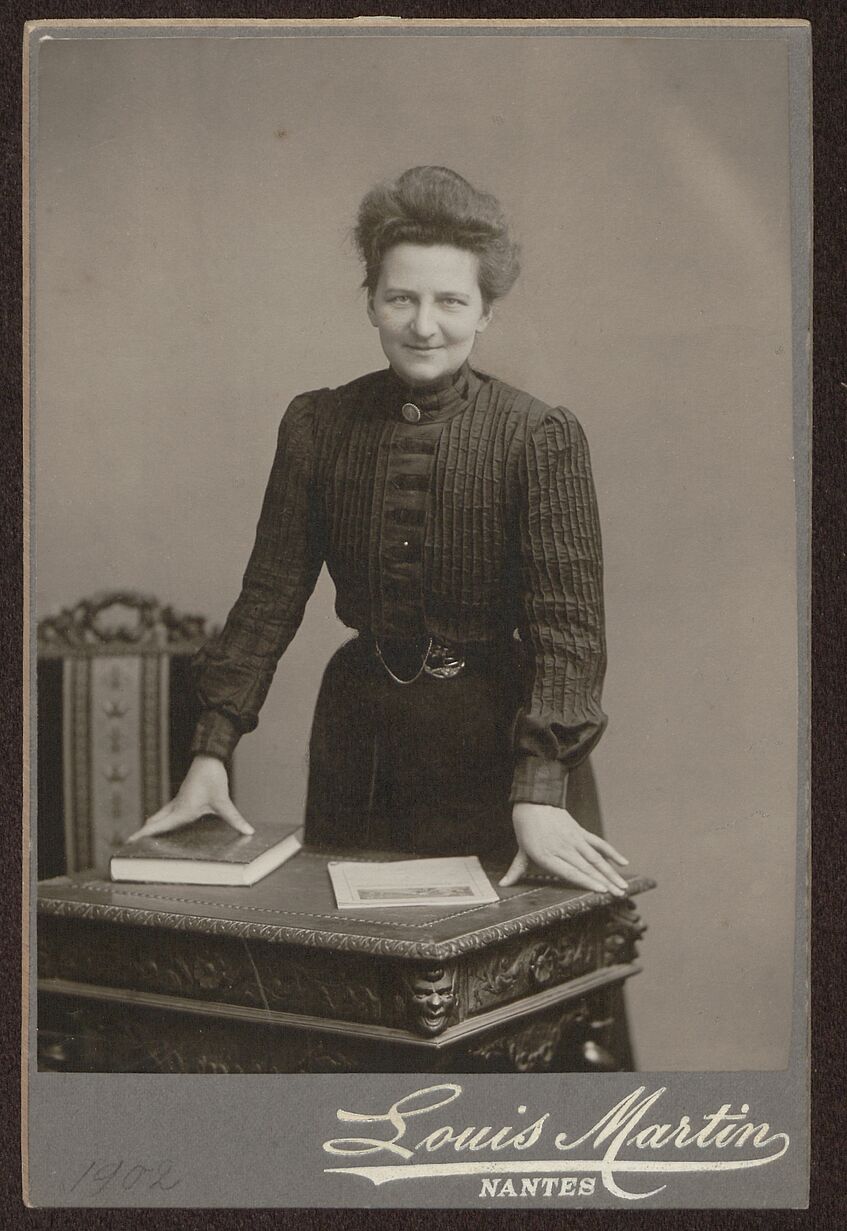Käthe Schirmacher (1865–1930)

Käthe Schirmacher, Nantes 1902
(Nl Sch 756/006)
Käthe Schirmacher (1865–1930)
Käthe Schirmacher was born on 6 August 1865 in Gdansk as the child of a liberal merchant family that was at first still well-off. In the 1890s she joined the Gdansk Women's Welfare Association and came into contact with the radical wing of the German and international women's movement. The two associations 'Verband fortschrittlicher Frauenvereine' and 'Weltbund für Frauenstimmrecht' were co-founded by her. Already as a young woman she began to travel, so she stayed in the USA for several months in 1893 on the occasion of the international women's congress in Chicago. She studied at the Sorbonne in Paris, where she acquired the 'Agrégation' (1885 to 1887), and in the following years in Zurich, where she was one of the first German women to receive a doctorate in 1895.
In the years that followed, she was a member of the leadership of international women's movements and acted as a multilingual interpreter at women's congresses. From Paris, where she lived from 1895, she went on extensive lecture tours, worked as a correspondent for German, Austrian and French newspapers and magazines and published political writings, newspaper articles and novels.
From about 1904 Schirmacher increasingly turned to a 'völkisch', anti-democratic and anti-Semitic political context. She was involved in the 'Deutscher Ostmarkenverein', which pursued an aggressive 'Germanization policy' in the mixed-language areas of the German Reich. In 1910 she moved her permanent residence to her partner Klara Schleker in Marlow in Mecklenburg.
Due to increasing political differences and personal conflicts, Schirmacher finally broke with international, bourgeois-liberal women's movements in 1913, but according to her self-image she remained a women's rights activist. During the First World War, she served as a war propagandist, supervised German soldiers at the front, and advocated the military service of women. In 1918 she was one of the founders of the 'German National People's Party' and in 1919 she was elected to the National Assembly of West Prussia at short notice.
In the 1920s Schirmacher had health problems, but continued to write about women's issues and the 'Ostmarkenpolitik'; in 1921 she published her autobiography "Flammen". She died on 18 November 1930 during a stay at a health resort in Merano.
For several decades Käthe Schirmacher kept in touch with countless correspondents from various political and social contexts. In addition to a multitude of documents such as manuscripts, printed works, newspaper articles, notes and diaries, Käthe Schirmacher's estate consists of a collection of about 14,000 letters.
Most important publications
1891
Die Libertad
1893
Halb (Roman)
1894
Der internationale Frauenkongress in Chicago
1896
Herrenmoral und Frauenhalbheit
Züricher Studentinnen
1897
Theopile de Viau. Sein Leben und seine Werke (1591-1626)
Aus allen Herren Länder
Literarische Studien und Kritiken
1898
Voltaire. Eine Biographie
1900
Paris. Ein Skizzenbuch
1905
Die moderne Frauenbewegung
Der junge Voltaire und der junge Goethe
Die Frauenarbeit im Hause
1906
Deutschland und Frankreich seit 35 Jahren
Voltaire. Seine Persönlichkeit in seinen Werken
Die amerikanischen Kindergerichte
1908
Die östliche Gefahr
Die Trennung von Staat und Kirchen in Frankreich
Danziger Bilder. Ein Kinderbuch
Voltaire. Briefwechsel
Zwischen Schule und Ehe
1910
Moderne Jugend. Ein Wegweiser für den Daseinskampf
Die Verteidigung der Ostmark
1911
Was ist national?
Das Rätsel Weib. Eine Abrechnung
1912
Die Suffragettes
Die Frauenarbeit im Hause
1913
1813 und die Ostmark
1915
Die nationalen Schäden der deutschen Einwanderung in Paris
Die deutsche Vertretung im Ausland
Deutsche Erziehung und feindliches Ausland
1916
Deutschland über alles
1917
Völkische Frauenpflichten
1918
Frauendienstpflicht
Die Frau und die Parteien
1919
Ostmark
1921
Flammen. Erinnerungen aus meinem Leben
1922
Die Geknechteten. Die reichsdeutsche Irredenta
Von Deutschland
Das Weltproblem
1923
Unsere Ostmark
Grenzmarkgeist
Danziger Bürgerleben in der Vergangenheit
1925
Von Mann und Weib
Ostfragen/Schicksalsfragen
1927
Was verdankt die deutsche Frau der deutschen Frauenbewegung?
1932
Um Deutschland. Nachgelassene Schriften
